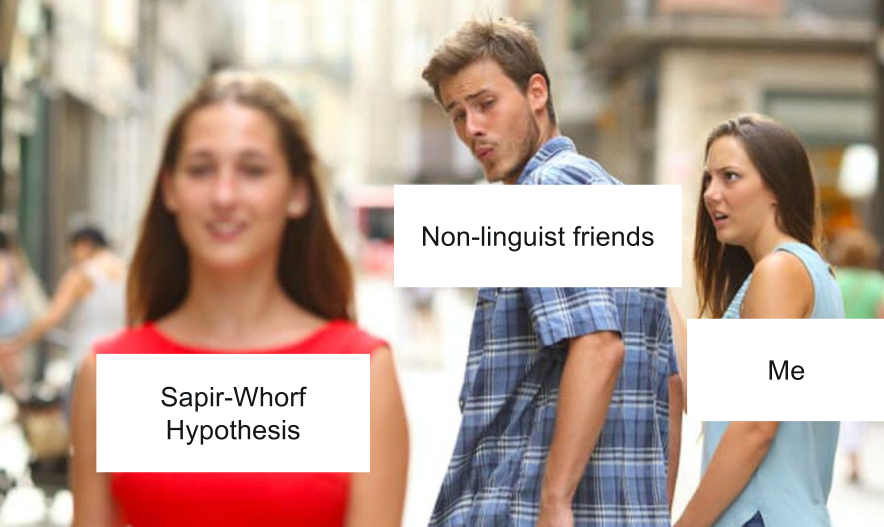Hello, and welcome to my new monthly(ish) column about language and linguistics in science fiction and fantasy! My name is Conni (CD) Covington, and I have MAs in both German and linguistics. I wrote my linguistics thesis on the effect of usage frequency on verbal morphology in a subset of German strong verbs (class VII), and my analysis suggests that there is a threshold frequency below which strong (“irregular”) verbs are most likely to become weak (“regular”). Catch me at a con, and I will happily talk your ear off about this! Broadly, I’m interested in how people use language: why a particular group of people uses a particular set of words and what it means to do so; whether it’s snuck or sneaked; what effects the massive increase in global communication allowed by social media is having on languages.
On the SFF end of things, I am a graduate of Viable Paradise 17 (2013), and I’ve had a few short stories published in anthologies. I tend to read or watch space opera-type stuff, like Bujold’s Vorkosigan series, CJ Cherryh’s Alliance-Union and Foreigner series, Yoon-Ha Lee’s Machineries of Empire series, Babylon 5, and The Expanse. I enjoy mecha anime, mainly Gundam and Macross. I haven’t read a lot of fantasy recently, but Lord of the Rings was very formative when I read it the first time, aged 10. That sparked my interest in languages, like it did for a not-insignificant portion of my fellow linguists.
What is this column going to be about? I’ll be taking a look at the ways various authors use language in their works, and, in some cases, how linguists and linguistics are portrayed in fiction and media. I have a running list of works I want to talk about in a notebook—and I’ll take suggestions! Some of these topics will be positive, some will be neutral, and some things just make me want to hit my head against a wall.
Sapir-Whorf and SFF
The Sapir-Whorf hypothesis is a very commonly used trope in speculative fiction (for example, it shows up in Arrival, Ancillary Justice, and Embassytown), so this first entry will give some background information on the concepts involved.

Also known as “linguistic relativity,” the Whorfian hypothesis declares that the language one learns shapes the way people think. On the surface, this sounds like common sense, right? If you don’t have a word for a thing, how can you imagine or discuss that thing? Once you dig a little deeper, though, it becomes stuff and nonsense. You can invent a word for a new thing. Before computers existed, no one had a word for the thing, so we invented plenty of words to talk about them and how to use them and program them and make them. Someone had to come up with the idea to use a machine to calculate things.
Alternatively, you can borrow a word for a new thing. English has a plethora of them, including scribe (from Latin), cherry (from French), Zeitgeist, angst, poltergeist, gestalt, Weltanschauung (all from German), plus a lot of vocabulary that came from colonization, like mango and khaki.
There is, admittedly, some potential validity to a weak version of the hypothesis. Language is a product of society, which is tightly woven with culture. If cultural norms equate femaleness with weakness and frailty, and maleness with strength and virility (from Latin vir ‘man,’ related to English wer—as in werewolf, weregild), people may associate these things in their minds. It’s this concept that is behind the push for more sensitive use of language, and not using words derived from slurs or insults in a casual manner—like not using ‘lame’ or ‘gay’ as a generic pejorative, and instead choosing a more specific word to convey your actual intended meaning, like ‘ridiculous’ or ‘terrible.’ Unweaving culture from society from language is extremely difficult, although it seems more likely to me that sociocultural norms are what shape worldviews and language reflects that.
Linguists have abandoned the Sapir-Whorf hypothesis, but it lives on in anthropology, where people study the effects of various color words on color recognition: i.e., if people have a word for dark blue and light blue, as in Russian, whether that allows Russians to perceive more colors than English speakers, who have to preface “blue” to distinguish it, rather than say goluboy or siniy. Some studies suggest a difference, while others suggest they are unreliable. Anthropologists also study the effect of relative (left, right) versus absolute (north, south) systems of direction, or counting systems (most famously, the Pirahã).
Every now and then, you get economists making claims that people who speak languages with a strong future tense are less likely to think about the future. This is, clearly, nonsense. This economist claims that English has a “strong future” tense—when, strictly speaking, it has no future tense at all, only a periphrastic (needs a helping verb) future. In English, the present tense can indicate the future, as in “the movie starts at 6, don’t be late” or “I’m going to the store tomorrow.” So English is definitely not a strong future language! The linked article dissects the claim in thorough detail, and it links to follow-up articles at the end.
The wonderful people at Language Log have written a variety of posts about the Whorfian hypothesis, which are excellent.
The Whorfian hypothesis is bad science, but it can make for great fiction. One of the key features of SFF is speculation—a “what if?” In some cases, the question is “what if language really did shape the worldview and cognitive processes?” If there are aliens involved, human neurobiology is less relevant. This is just one more thing I have to suspend disbelief over—aliens, FTL travel, linguistic relativity. A good, well-written story will allow me to keep my disbelief suspended, while a less-well-written one may break that suspension. Come along with me as I read and discuss stories where my disbelief stayed suspended—or where it was broken.
What’s next: My next columns are going to look at the field linguistics in Arrival and types of aphasia in Butler’s “Speech Sounds.” I hope to see you there!
CD Covington has masters degrees in German and Linguistics, likes science fiction and roller derby, and misses having a cat. She is a graduate of Viable Paradise 17 and has published short stories in anthologies, most recently the story “Debridement” in Survivor, edited by Mary Anne Mohanraj and J.J. Pionke.










